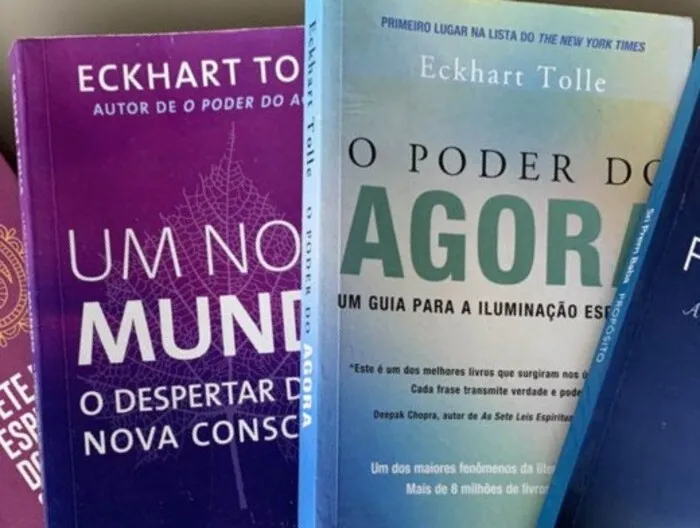The spiritual journey is an ongoing search for meaning, understanding and connection. In an increasingly complex and challenging world, many look to spiritual books as a source of inspiration, comfort and guidance.
Adverts
This selection of essential books addresses themes of faith, spirituality and personal growth, offering profound and transformative insights for those seeking to deepen their inner journey.
At the heart of the spiritual quest is the human desire to understand the greater purpose of life, our connection to the universe, and how we can live more harmoniously and meaningfully.
Spirituality books therefore become not just readings, but companions on this journey, offering comfort in moments of doubt and illuminating paths in moments of darkness.
They act as beacons, guiding us through the complexities and challenges of human existence, while helping us navigate deep questions about who we are and what truly matters. In addition to providing answers, many of these books encourage introspection and self-analysis, crucial elements in spiritual growth.
They challenge us to look within ourselves, to confront our shadows, fears and insecurities, and to emerge with a deeper understanding of our true nature. This self-exploration often leads to a greater sense of peace, balance, and fulfillment.
“The Power of Now”, one of Eckhart Tolle’s books
Eckhart Tolle, in “The Power of Now”, unravels the mystery of time and how our relationship with it profoundly affects our spiritual and emotional life.
He argues that most people live trapped by memories of the past or expectations of the future, neglecting the only moment they truly have: the present. Tolle emphasizes that it is in the “now” that we find true freedom and fulfillment.
For Tolle, negative thoughts are often products of our resistance to the present moment. He suggests that by surrendering to the now, we can transcend these thought patterns.
This does not mean passivity, but a state of active consciousness, where we accept the present as it is, making room for profound internal change.
Tolle also explores the concept of the inner “self” and how our excessive identification with the ego – our self-constructed and always unfulfilled identity – creates suffering.
He proposes that by disidentifying from the ego and reconnecting with our deepest essence, which is timeless and unchanging, we can experience a peace and joy that is not dependent on external circumstances.
Through “The Power of Now”, Tolle offers practical meditation and self-reflection exercises, encouraging readers to observe themselves, especially in times of difficulty and stress. This self-awareness practice helps surface thought patterns and emotions that keep us stuck in cycles of suffering.
“Autobiography of a Yogi”, book by Paramahansa Yogananda
This work is one of the most revered in the spiritual world. “Autobiography of a Yogi” recounts the life of Paramahansa Yogananda and his search for spiritual enlightenment. The book offers a fascinating insight into the world of miracles, the science of yoga, and the transcendental unity between religions.
The impact of this book goes beyond a simple biographical account, becoming a work that challenges the limits of spiritual perception and understanding. Yogananda, born in India at the end of the 19th century, brings a vivid and detailed testimony of his mystical experiences and encounters with various saints and sages.
His narratives not only describe extraordinary events, but also highlight the importance of a deep inner connection and constant spiritual practice.
The book addresses the importance of Kriya Yoga, an ancient meditative practice, as a path to spiritual fulfillment. Yogananda explains how this technique can accelerate an individual's progress on the path to enlightenment.
He emphasizes that Kriya Yoga is not just a physical practice, but a set of teachings that promote harmony between body, mind and spirit.
Furthermore, “Autobiography of a Yogi” offers a unique look at the unity of diverse religious traditions. Yogananda shows that, despite the external differences between religions, there is a common spiritual core that unites them.
He argues that direct experience of the divine, regardless of the religious tradition followed, is the ultimate goal of all spiritual practices.
“The Alchemist” by Paulo Coelho
“The Alchemist”, by Paulo Coelho, is not just a story about following your dreams; is a profound exploration of the meaning of life's journey. Through the story of Santiago, a young Andalusian shepherd, the book involves us in an adventure full of symbolism and life lessons.
Santiago's journey is more than the search for earthly treasures; it is a search for self-knowledge, wisdom and spiritual connection.
The narrative is woven with themes of magic, mysticism and philosophy, where each character Santiago encounters represents different aspects of human and spiritual wisdom. The book highlights the importance of listening to our heart and understanding that intuitions are messages from the soul, guiding us towards our true destiny.
Coelho skillfully weaves elements of folklore and spiritual tradition to illustrate that each individual's personal journey is part of a larger tapestry of human existence.
Furthermore, “The Alchemist” addresses the idea that the universe conspires in our favor when we pursue our true dreams. This notion, often referred to as the “Personal Legend,” is a call for each person to recognize and follow their innermost desires, which are uniquely theirs.
The story emphasizes that in doing so, we not only fulfill ourselves individually, but also contribute to the greater good of the world.
“Conversing with God” by Neale Donald Walsch
“Conversing with God”, by Neale Donald Walsch, is more than a book; it is a transformative experience that challenges the traditional limits of spirituality. In this groundbreaking dialogue, Walsch presents an intimate and revealing conversation with an entity he interprets as God.
The book moves between the personal and the universal, touching on issues that resonate in the heart of every human being.
The work begins with the author in a moment of personal despair, asking questions to the universe without expecting an answer. Surprisingly, he receives answers that begin a series of profound dialogues.
These conversations cover a variety of topics, from everyday challenges to the great mysteries of existence.

Walsch explores themes such as the nature of love, the purpose of suffering, the complexity of human relationships, the search for professional success and the meaning of life and death.
What makes “Conversing with God” unique is the way these questions are addressed. Far from being a divine monologue, the book presents itself as a genuine dialogue, where God is not a distant and inaccessible figure, but an intimate, understanding and loving presence.
This approach demystifies spirituality and makes it accessible to everyone, regardless of their religious beliefs.
“The New World” by Eckhart Tolle
In “The New Earth,” Eckhart Tolle not only identifies the problems caused by ego and self-centered thinking, but also offers practical solutions to overcome them. He argues that many of the conflicts and challenges we face, both on an individual and collective level, are the result of a disconnection with our deepest essence.
The ego, with its constant need for control, recognition and security, keeps us trapped in patterns of thought and behavior that take us away from our true nature.
Tolle suggests that the key to overcoming these challenges lies in recognizing the presence of the ego and understanding how it influences our perceptions and actions. In doing so, we can begin to question the limiting narratives and beliefs that have been imposed on us, both by ourselves and by society.
This requires continuous work on self-awareness and introspection, where meditation and mindfulness play a crucial role.
Furthermore, “The New Earth” encourages the reader to adopt an attitude of compassion and empathy, both towards oneself and towards others.
In doing so, we begin to cultivate a sense of connection and unity with the world around us. Tolle argues that this shift in perspective is essential to creating a more peaceful and sustainable world.
Conclusion: Spiritual Books
Each of these books offers a unique and transformative perspective on spirituality and personal growth. Whether you are an experienced spiritual seeker or someone just beginning to explore this path, these books can serve as valuable compasses on your journey.
They remind us that despite the countless distractions and challenges of modern life, the search for greater meaning and a deeper connection with the universe is a journey worth taking.
This journey, however, is not just about finding external answers, but also about diving deep within yourself. Each page of these books acts as a mirror, reflecting internal aspects that are often ignored or unknown.
They offer an opportunity for self-knowledge and self-questioning, crucial elements for any type of spiritual growth.
As you read, it is not uncommon to find stories and teachings that resonate deeply with our personal experiences.
It is as if, through words, we are guided to a clearer understanding of our own challenges, fears and aspirations. This connection creates a sense of universality, reminding us that we are not alone in our search for meaning.




